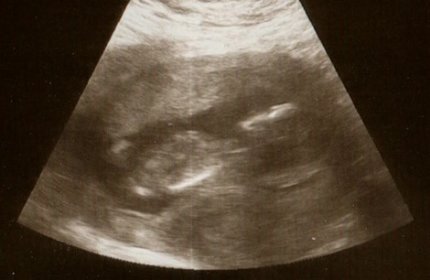
And in Oklahoma, the state senate voted 38-4 to pass Senate Bill 1433 (S.B. 1433), changing the state's definition of the word "person" to include unborn children "from the moment of conception." While backers of the bills insist they don't restrict abortion, stem-cell research, or contraception, opponents warn that the bills erode women's reproductive rights and could have far-reaching consequences.
What do these bills really mean for women?
The Virginia bill now heads to that state's Senate for debate; if it passes in the Senate, governor Robert McDonnell has said that he would consider the bill, but did not promise to sign it or to veto it. The Oklahoma bill now goes to the state's House, where there are more than twice as many pro-life politicians than pro-choice ones; Oklahoma governor Mary Fallin, who Reuters reports has signed "every anti-abortion bill sent to her last year," did not issue a statement about the bill. All four Republican candidates for U.S. President support the idea of a federal personhood amendment.
Virginia Democratic Delegate Eileen Filler-Corn told CNN that the legislation represented an "overreach by the state."
"These decisions should be left to a woman and her physician, a medical professional," Filler-Corn said. "This is a slippery slope and eventually, the goal of the personhood movement is to ensure that birth control is illegal."
This is the third time that Republican state representative Bob Marshall has proposed a personhood bill in Virginia, and he says that the bill would not prevent access to legal birth control though when asked to put that in writing, he and other state Republicans refused, voting 64 to 34 against adding an amendment protecting access to contraception.
"The legal effect here is [if] a pregnant woman is driving in an intersection and someone runs into her, she can sue for loss of a child," Marshall explained. "Under the current code, a mother cannot do that."
But Marshall was blunt about the bill's pro-life intent: "You'd have to be completely obtuse to not understand that is something I have worked toward for 20 years," he candidly told the Huffington Post. In an interview with CNN, he explained: "We need to get back to the respect for life that we used to have in this country that's been lost."
Here's the thing: It's easy to say that life begins at conception. But it's impossible to accurately identify the instant that actually happens within an individual woman's body. There is no medical way to test for fertilization; pregnancy tests detect hormone changes in the blood nine to 10 days after the sperm meets the egg (urine tests take even longer). And, given that a fertilized egg can't develop into a fetus if it hasn't implanted properly in the womb, if the personhood bill becomes law there would be a seven to 10 day window (the time it takes for a fertilized egg to travel from the Fallopian tubes to the uterus and successfully implant) during which a person with full legal rights and privileges is literally in limbo.
The issue doesn't end when implantation takes place, either: If that bundle of cells has individual legal rights, yet can't survive outside of the womb, the implications can be vast. According to the American Pregnancy Organization, studies show that 10 percent to 25 percent of all clinically confirmed pregnancies end in miscarriage and 50 percent to 75 percent of those miscarriages occur shortly after implantation, when a woman usually doesn't yet know she's pregnant. Though Virginia's HB1 specifically states that "Nothing in this section shall be interpreted as creating a cause of action against a woman for directly or indirectly harming her unborn child," it does not contain language protecting medical professionals who may be treating the pregnant woman and it does not prohibit the government from intervening on behalf of the still-developing baby. Oklahoma's S.B 1433 offers no such protection for pregnant women, which means that women who miscarry could be prosecuted unless they could prove it was unintentional.
Chorionic villus sampling (CVS) and amniocentesis, two standard medical procedures used to identify chromosomal abnormalities in utero, each have about a two-percent miscarriage rate that is, for every 100 times either one is performed, there are, on average, two miscarriages. There are anembryonic pregnancies, in which the fertilized egg implants into the uterine wall but fetal development never begins, and ectopic pregnancies, in which a fertilized egg implants somewhere other than in the uterus and must be removed in order to save the woman's life. Not all embryos created during fertility treatments survive once they're transferred to the womb. If a personhood bill becomes law, does a medical intervention become murder?
Four states, Louisiana, Mississippi, North Dakota, and South Dakota, ban abortion outright; their laws would automatically go into effect if Roe V. Wade were overturned. Thirteen other states have abortion bans that are unenforced. Personhood bills have failed in Mississippi and Colorado; a second bill in Oklahoma would outlaw emergency contraception like Plan B, certain fertility treatments, and abortion in all cases, even for rape or incest.
Calling the personhood bills absurd and sexist, Democratic state senator Constance Johnson of Oklahoma City introduced a bill of her own in early February, granting similar rights and benefits to sperm. Her bill stated: "Any action in which a man ejaculates or otherwise deposits semen anywhere but in a woman's vagina shall be interpreted and construed as an action against an unborn child." It failed, as did one proposed by Democratic state senator Jim Wilson of Oklahoma that would have required the father of the unborn child to be financially responsible for the mother-to-be's housing, healthcare, transportation, and food while pregnant.

No comments:
Post a Comment